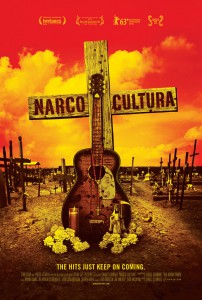
Directed by Shaul Schwarz
USA, 2013
Note. This review originally appeared at Sound on Sight when the film played at this year’s Fantastic Fest. It has been updated to tie in with the film’s wider theatrical release.
One of the most shocking moments of the new documentary Narco Cultura comes near the end, as one of the musicians who profits from the most heinous and violent acts committed by Mexican drug cartels deliberately misquotes a memorable line from Brian de Palma’s Scarface: “First you get the money, then you get the power, then you get the bitches.” The surprise is not that the 1983 gangster opus is name-dropped here, but that it only happens once. The hits just keep on coming in Narco Cultura, a thoroughly horrifying look at the neverending criminal battle going on south of the border.
Narco Cultura‘s director and cinematographer Shaul Schwarz splits the focus in two: half of the film looks at Richi Soto, a Mexican crime scene investigator, as he goes about his day-to-day job with a seemingly infinite amount of drug-related murders to process. Richi, the heart of the film, matter-of-factly describes that his is a job drowning in the possibility of death; so many of his colleagues have been gunned down at home, picking kids up from school, and more. It’s in this half that we see the severity and horror of drug-related violence. The other half is a stark and chilling juxtaposition, focusing specifically on Edgar Quintero, a narco corridos singer on the rise. Narco corridos, we are told, is potentially the heir apparent to hip-hop, as its performers champion drug-cartel violence and even go so far as toting bazookas during their stage performances.
There is no end to the amount of depraved and twisted imagery in Narco Cultura, nor to the baffling lack of confidence in law enforcement—Richi is presented as being far more upstanding than the others who wear a badge, many of them wondering (reasonably) why they should put their necks out on the line if it means they’ll be chopped off by someone who’ll never get captured, arrested, or prosecuted. Edgar, on the other hand, is living the high life, situated firmly in Los Angeles while the drug war his career is based on bubbles and boils beneath him. Schwarz is able to keep the momentum up throughout even though the divide between Richi and Edgar is fairly consistent: 10 or so minutes with Richi, followed by 10 or so with Edgar, and so on. Even though Edgar’s section is more lighthearted (in that the horrors of what goes on in Juárez don’t crop up), it’s possibly more disturbing to watch these singers celebrating some of the worst crimes, as it is in watching audiences in places from LA to Atlanta lap it up. Though it infrequently steps into the trap of manipulation—an ever-so-slightly overbearing score, along with some of Richi’s voiceover narration, which may echo his feelings but seems a bit scripted—Narco Cultura is truly harrowing stuff.
And it’s perhaps fitting to consider this film in light of the recently aired final episodes of the best show on television, Breaking Bad. That show not only is about the nasty allure of criminality, but even had a narco corridos sequence in its second season. More specifically, the question of why people side or root with its lead character, a noted drug dealer who’s directly and indirectly responsible for countless deaths, became a fierce debate throughout Breaking Bad’s final season. To watch Narco Cultura is to be reminded that, even as something fictional like Breaking Bad inflamed and excited audiences (even as it was pitch-black drama at its finest), the real drug war still rages on in Mexico as most US citizens turn a blind eye. Or, as in one withering moment, we simply parrot talking points: a Border Patrol spokesman is asked if, by catching fewer illegal immigrants trying to hop the fence into the States, the problem is getting better or it’s just getting worse. The spokesman has no real answer; neither does Narco Cultura, but its ability to remind us of the blood-spattered nation below is a powerful enough statement.
— Josh Spiegel


